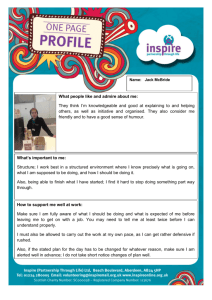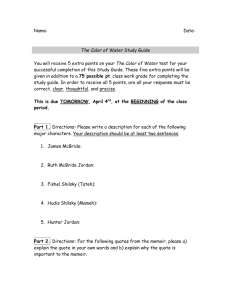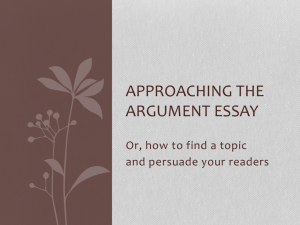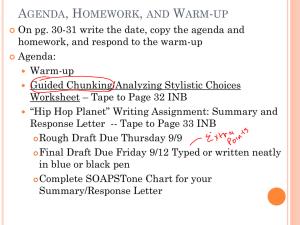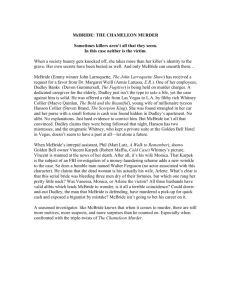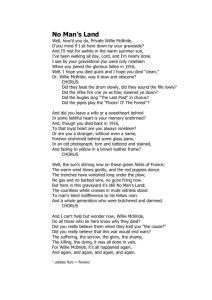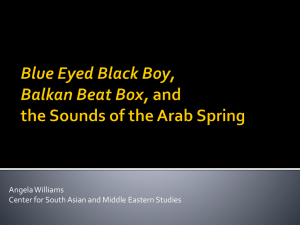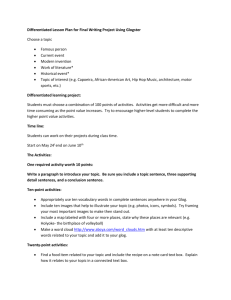Hip-Hop Student
advertisement
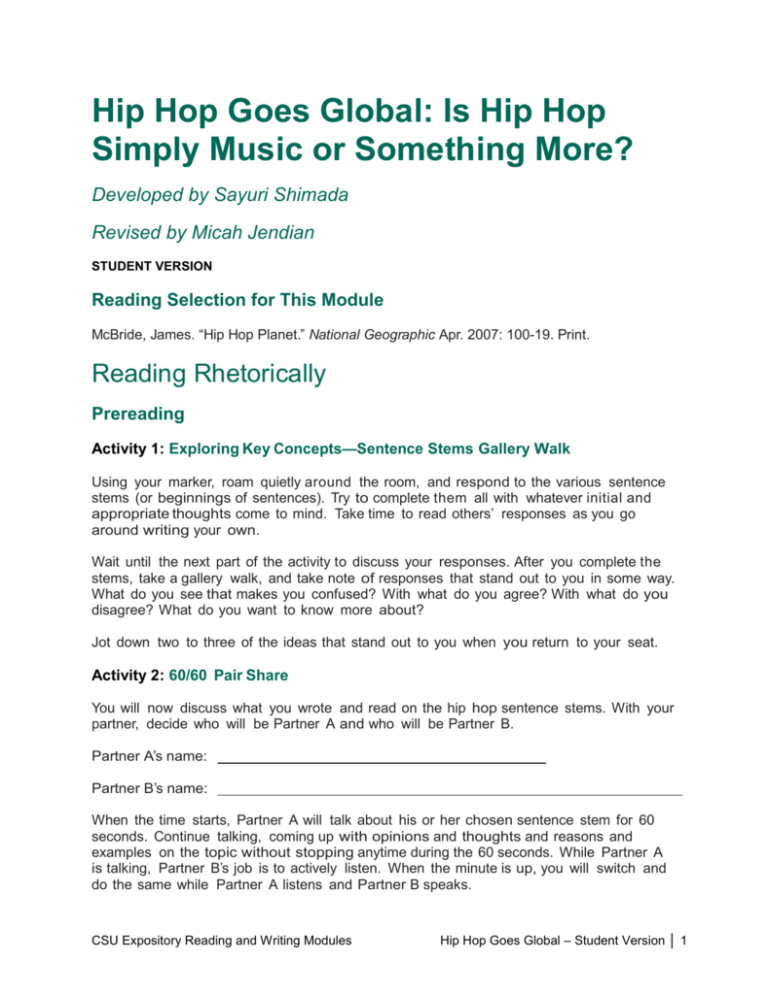
Hip Hop Goes Global: Is Hip Hop Simply Music or Something More? Developed by Sayuri Shimada Revised by Micah Jendian STUDENT VERSION Reading Selection for This Module McBride, James. “Hip Hop Planet.” National Geographic Apr. 2007: 100-19. Print. Reading Rhetorically Prereading Activity 1: Exploring Key Concepts—Sentence Stems Gallery Walk Using your marker, roam quietly around the room, and respond to the various sentence stems (or beginnings of sentences). Try to complete them all with whatever initial and appropriate thoughts come to mind. Take time to read others’ responses as you go around writing your own. Wait until the next part of the activity to discuss your responses. After you complete the stems, take a gallery walk, and take note of responses that stand out to you in some way. What do you see that makes you confused? With what do you agree? With what do you disagree? What do you want to know more about? Jot down two to three of the ideas that stand out to you when you return to your seat. Activity 2: 60/60 Pair Share You will now discuss what you wrote and read on the hip hop sentence stems. With your partner, decide who will be Partner A and who will be Partner B. Partner A’s name: Partner B’s name: When the time starts, Partner A will talk about his or her chosen sentence stem for 60 seconds. Continue talking, coming up with opinions and thoughts and reasons and examples on the topic without stopping anytime during the 60 seconds. While Partner A is talking, Partner B’s job is to actively listen. When the minute is up, you will switch and do the same while Partner A listens and Partner B speaks. CSU Expository Reading and Writing Modules Hip Hop Goes Global – Student Version │ 1 Activity 3: Sentence Stem Quickwrite Choose one of the sentence stems, and complete a quickwrite in which you use personal experiences, knowledge, and observations to expand upon the main idea you’ve chosen. You may use your peers’ ideas from the sentence stem posters or ideas from the 60/60 Pair Share to help you write your reflection. Activity 4: Getting Ready to Read—Quickwrite Write a journal entry in which you reflect and respond to the following prompt: What influence does hip hop have in our society or in our world? What is its message? Is it just music or something more? Respond to these questions with examples from your own experience and observations. Activity 5: Understanding Key Vocabulary In the following Vocabulary Scaffold Organizer, the vocabulary words and their meanings are provided for you. Give an example of the word in your own words and complete the example sentence. Vocabulary Scaffold Organizer Word (part of speech) Meaning Examples (What it is, Where I see it, What pictures come to mind) Example Sentence 1. credibility (noun) Worthy of belief or confidence; capable of being believed has a (expert’s name) lot of credibility in the field of . (area of expertise) 2. permeated (verb) Leaking into, or spreading through, reaching many places The style trend of has permeated through teens who like . (specific example of trend stated above) CSU Expository Reading and Writing Modules Hip Hop Goes Global – Student Version │ 2 3. to linger (verb) lingering (adj.) To stay around, or hang around for a while I kept having a lingering feeling I would be called back to play on the team, since . 4. to embrace (verb) To hold, or hug, or welcome someone or something I find that it’s easy to embrace the ideas of my friend , (friend’s name) when he/she talks about . (topic where you and your friend tend to agree) 5. legacy (noun) The heritage or powerful story that a person or group of people leave behind left a (person’s name) legacy because of how influential he/ she was as a(n) . (career title/role the person held) Your choice: 6. Activity 6: Surveying the Text Discuss and write down answers to the following questions (as a class, with a partner, or in a small group): Read the source notes at the end of the text. In what publication was this text published? What do you know about the source? Is it credible? Read the background information about James McBride. Given this information, what can you expect from the piece? Why? CSU Expository Reading and Writing Modules Hip Hop Goes Global – Student Version │ 3 Activity 7: Making Predictions and Asking Questions Complete the following Discussion and Prediction Chart with your partner by reading and then discussing each question. Then, come to an agreement on some common predictions. Take turns reading the questions aloud, and alternate who responds first to the questions. As your partner responds, take notes in the right column. Discussion and Prediction Chart: Hip Hop Planet Question What I think What my partner thinks Title: Based on the title, what do you think you will be reading about? Paragraph 1: What does this paragraph tell you about how McBride feels about hip hop? Paragraph 1: What does McBride realize in this nightmare scenario? Paragraph 1: What do you predict McBride will discuss in his essay? Last Line (12): What do you think McBride might be referring to? Can we…what? Make a list of possible endings to the question based on the topic. CSU Expository Reading and Writing Modules Hip Hop Goes Global – Student Version │ 4 What We Think (three sentences): We think that James McBride will discuss how… What We Wonder: Three questions we have for McBride Reading Activity 8: Reading for Understanding 1. Highlighting with a Purpose Now you will finish reading the rest of the essay. As you read, highlight any main idea phrases or sentences. Remember: Main ideas are general statements that highlight the most important ideas in a piece of writing. Main ideas are what the examples, reasons, or evidence help explain or prove. 2. Reviewing Predictions Refer to your discussion and prediction chart. Which of your predictions turned out to be true? Did McBride answer any of the questions you asked? Activity 9: Analyzing SOAPSTone Elements Complete the following SOAPSTone chart noting subject, occasion, audience, purpose, speaker, and tone for McBride’s article. When you are done, check your answers with a partner. Add or revise information as necessary. CSU Expository Reading and Writing Modules Hip Hop Goes Global – Student Version │ 5 Text Component “Hip Hop Planet” by James McBride Subject What is the subject or topic of the piece? What theme or big idea do you see? What is this piece about? Occasion What event or occasion do you think caused the author to write this piece? Audience To whom is the author writing? How do you know? Purpose What does the author want you to believe or understand? What is the purpose of the text? (choose one): • To educate or inform (if the author’s position was neutral) • To persuade or convince (if the author’s position was negative or positive) • To reflect on an important event or idea (poetry, personal narrative). Speaker What do we know about the speaker? How does his background affect his point of view on the subject? Tone What is the attitude of the speaker or writer as revealed by the choice of vocabulary? Tone words: academic, formal, informal, sarcastic, humorous, informative, reflective, persuasive, casual, argumentative, passionate, cautionary, condescending, respectful, etc. CSU Expository Reading and Writing Modules Hip Hop Goes Global – Student Version │ 6 Activity 10: Annotating and Questioning the Text Annotating the text is a way of making sure you understand the most important parts of a text. The word “annotation” includes the Latin root “not/nota,” which means “to mark or sign.” In this case, you are marking the text. Once you understand it, you can begin to analyze (think about its parts) and interpret (make meaning of it). Annotating the text is also a way to help you with your writing. By identifying and understanding what McBride uses in his essay to make it a strong piece of writing, you will be able to make your own writing more powerful. You will be making marginal notes. For this activity, you will make different notes in the left and right margins. LEFT MARGIN: Understanding Content and Purpose Highlight, underline, and make notes in the margin where you find the following: The issue McBride is writing about McBride’s main points Examples that show how McBride feels about the issue Examples of how hip hop is a global issue What McBride wants his readers to do or believe RIGHT MARGIN: Reacting to the Text Highlight, underline, and make notes in the margin where you Agree Disagree Have a question Have a comment Have any sort of reaction (This might mean feeling surprised, shocked, confused, or interested.) Activity 11: Noticing Language Review the examples and sentences you have for each word on your Vocabulary Scaffold Organizer. Add any examples or example sentences that you found within the text to your “examples” column. CSU Expository Reading and Writing Modules Hip Hop Goes Global – Student Version │ 7 Activity 12: Considering the Structure of the Text—Guided Chunking Why does an author use paragraphs? How does an author let the reader know when he is going to end the introduction? How do you know when the author is moving on to a conclusion? These are all questions that are part of considering the structure of a text— how a text is built. Below you will find a list of statements that describe the purpose of a paragraph or a chunk of paragraphs. Determine which paragraph or paragraphs can be chunked to match the statement. Write the number or numbers on the line provided. Circle the word that best describes what McBride’s purpose is in the paragraphs. In other words, what is he doing? 1. McBride argues about/describes/criticizes a nightmare that made him re-evaluate his perceptions of hip hop. Paragraph (s): 2. McBride disregards/states/recalls a personal experience about when he first heard hip hop music and how he felt about it. Paragraph (s): 3. McBride illustrates/conceals regret for not paying attention to hip hop as an art form and movement. Paragraph (s): 4. McBride highlights/mentions the national and global influence of hip hop. Paragraph (s): 5. McBride claims/questions that hip hop has an undeniable uniqueness and power. Paragraph (s): 6. McBride mentions/provides a picture of the roots of hip hop. Paragraph (s): 7. McBride employs statistics to prove/say how hip hop is more than just about music. Paragraph (s): 8. McBride challenges/threatens readers to acknowledge hip hop as a global and social movement, and not to ignore its power. CSU Expository Reading and Writing Modules Hip Hop Goes Global – Student Version │ 8 Paragraph(s): 9. What is McBride’s most powerful paragraph or chunk of paragraphs, and why? 10. Read the lines that stand alone in McBride’s essay. Why do you think those statements stand on their own? Activity 13: Analyzing Stylistic Choices—Stylistic Word Hunt All writers are mindful of the language they use and how they use it to make their audiences feel a certain way. McBride does the same here. Analyze the word choices in the following sentences. In each quote pulled from the article, bland (plain or simple) language has been substituted for McBride’s lively stylistic choices. Find the quotes, and figure out which words have been substituted. Write the author’s language in the space provided. Then explain how the word choices affect the overall tone of the piece. In other words, how does the author’s language suit the author’s purpose and audience? The following sentence starters may be helpful as you answer the questions below. By McBride’s usage of the word “ The word makes the reader feel… The word “ ” reminds me of ,” the reader thinks of… and . 1. For the next 26 years, I avoided that music the way you step over a crack in the sidewalk. Stylistic choice: What effect does the stylistic choice have? How does it make the reader feel? What does it make the reader think about? 2. Not since the advent of swing jazz in the 1930s has American music spread across the world with such overwhelming force. Stylistic choice: What effect does the stylistic choice have? How does it make the reader feel? What does it make the reader think about? 3. Whatever music it comes across becomes part of its vocabulary, as the commercial world falls into place behind it to take advantage of the powerful slop in its wake; it metamorphoses into the Next Big Thing. Stylistic choice: CSU Expository Reading and Writing Modules Hip Hop Goes Global – Student Version │ 9 What effect does the stylistic choice have? How does it make the reader feel? What does it make the reader think about? 4. At its best, hip hop shows us that we are lacking values of our generations’ legacy. Stylistic choice: What effect does the stylistic choice have? How does it make the reader feel? What does it make the reader think about? Postreading Activity 14: Reflecting on Your Reading Process Before we move into the more formal writing component of this module, reflect on your experience reading the text. In what ways has your reading and understanding of this text improved as a result of our work with it? What reading strategies helped you most to deepen your understanding of the text? How can you apply these reading strategies in reading other texts and in other classes? Connecting Reading to Writing Discovering What You Think Activity 15: Considering the Writing Task Summarizing and Responding in a Letter to James McBride Now that you have considered the topic of hip hop and its global influence, you will write a summary and response in the format of a letter. Your task is to compose a letter to James McBride with the purpose of letting him know what you think about the claims he makes about the importance and power of hip hop in his essay. The first portion of the letter will be a summary where you show McBride that you understand the main points of his essay. The second portion of your letter will be a thoughtful and formal response to his ideas. Directions for the summary: Begin your letter with a one-paragraph summary of the essay following the steps below: CSU Expository Reading and Writing Modules Hip Hop Goes Global – Student Version │ 10 In the first sentence, state which of his texts you read in “quotation marks” and the subject of the essay. Next, inform Mr. McBride that you understand what occasion may have made him want to write this essay. Follow this with two to three sentences summarizing the key ideas of the article. Your last sentence should state what you believe was his purpose for writing the essay and his intended audience. Reminders for the summary portion of your letter: Address the author as Mr. McBride. Use your own words. Do not include quotations or direct sentences from the article. Keep your opinion out of the summary. A summary is not the place to agree or disagree. Directions for the response: Write a one-paragraph response to the essay following the order of the steps below: In the first sentence, state whether you agree or disagree that we have become a “hip hop planet.” Choose one to two main idea statements from McBride’s essay, and explain to him how you agree or disagree with the statements by providing reasons and examples from your own experiences and observations. Close your paragraph by stating whether McBride’s essay was strong or weak, and explain to him why he did or did not make his point. Reminder for the response portion of your letter: Use words from your vocabulary scaffold as they pertain to your topic. In pairs, complete the SOAPSTone chart to clarify the subject, occasion, audience, purpose, speaker, and tone for your own letter. SOAPSTone Chart for your Letter to McBride CSU Expository Reading and Writing Modules Hip Hop Goes Global – Student Version │ 11 Text Component Your Summarizing and Responding Letter Subject What is the subject or topic of your letter? What is it about? Occasion What event or occasion is causing you to write this letter? Audience To whom will you be writing? Purpose What is the purpose of your letter? Speaker Who is the speaker? Tone What kind of tone do you want to have? How do you want to present yourself so that he will listen to what you have to say about his ideas? Activity 16: Getting Ready to Write and Gathering Evidence to Support Your Claims Much of your prewriting work for your letter has already been accomplished through the reading activities you have already completed. Gather and review your various notes, quickwrites, and vocabulary activities to see what you might want to incorporate into your letter. You may want to organize your support material into information appropriate for the summary portion of your letter and your ideas that would be appropriate for the response portion of the letter. CSU Expository Reading and Writing Modules Hip Hop Goes Global – Student Version │ 12 Writing Rhetorically Entering the Conversation Activity 17: Composing a Draft of Your Summary Referring to the materials you have gathered from your previous work with McBride’s article and the directions for the summary on the writing assignment (and here again below), begin drafting the summary portion of your letter to McBride. Directions for the summary: Begin your letter with a one-paragraph summary of the essay following the steps below: In the first sentence, state which of his texts you read in “quotation marks” and the subject of the essay. Next, inform Mr. McBride that you understand what occasion may have made him want to write this essay. Follow this with two to three sentences summarizing the key ideas of the article. Your last sentence should state what you believe was his purpose for writing the essay and his intended audience. Reminders for the summary portion of your letter: Address the author as Mr. McBride. Use your own words. Do not include quotations or direct sentences from the article. Keep your opinion out of the summary. A summary is not the place to agree or disagree. Activity 18: Using the Words of Others—Preparing to Write Your Response Direct quotations and paraphrasing are two ways that you can use the words of others. When you directly quote a writer, you are using the writer’s exact words. Therefore, you must place the writer’s words in quotation marks. When you use a writer’s words and ideas, but you put them into your own words, you are paraphrasing. You must still make sure you let your readers know that the ideas are not your own. A summary restates the points of a text. A response asks you to provide your opinions regarding the text, its main points, its arguments, and its use of reasons and examples. To make your response clear, you need to use the author’s words and ideas. You can refer to things McBride says by paraphrasing his words and making sure you note that they are his ideas. Or, you can directly quote McBride. CSU Expository Reading and Writing Modules Hip Hop Goes Global – Student Version │ 13 Select and write down one or two quotations from McBride’s essay which best represent the main ideas you are most interested in responding to in the response portion of your letter. 1. “ ” (paragraph #). 2. “ ” (paragraph #). Work with the sentence frames below to introduce, integrate, and/or paraphrase direct quotations in your response: Mr. McBride, you claim that “ ” (paragraph #). When you explain how “ wonder about… (paragraph #). ,” it makes me According to you, “ With all due respect, I wonder what you mean when you say,“ ,” (paragraph #). ” (paragraph #). To help you paraphrase and respond to McBride’s ideas, use the following sentence frames: In the When you say , you claim that , but I think… When you say think… , you claim that , and I also paragraph, you discuss how… It seems as if you believe that… To help you agree or disagree using your own ideas, use one of the following sentence frames: Like you, I believe… Though I see your perspective, I believe… Activity 19: Composing a Draft of Your Response Referring to the materials you have gathered from your previous work with McBride’s article and the directions for the response on the writing assignment (and here again below), begin drafting the summary portion of your letter to McBride. Directions for the response: Write a one-paragraph response to the essay following the order of the steps below: CSU Expository Reading and Writing Modules Hip Hop Goes Global – Student Version │ 14 In the first sentence, state whether you agree or disagree that we have become a “hip hop planet.” Choose one to two main idea statements from McBride’s essay, and explain to him how you agree or disagree with the statements by providing reasons and examples from your own experiences and observations. Close your paragraph by stating whether McBride’s essay was strong or weak, and explain to him why he did or did not make his point. Reminder for the response portion of your letter: Use words from your vocabulary scaffold as they pertain to your topic. Revising and Editing Activity 20: Revising and Editing by Giving, Receiving, and Responding to Feedback Good writing is rewriting. Before submitting your final letter, exchange your letter with a classmate. Using the Essay Summary and Response Rubric below, offer feedback to assist your classmate in improving his or her letter. In the right hand column, note with –” how effectively you think your classmate’s letter fulfills the various requirements of the writing task. Peer Feedback Summary and Response Rubric [+ = good; = satisfactory; — = developing or absent] Mark – Requirements Summary Paragraph Includes title in quotation marks, the author’s full name Includes a statement which notes McBride’s occasion for writing Includes a concise summary of McBride’s key ideas and purpose Does NOT include opinion Response Paragraph States whether he or she agrees or disagrees with McBride that we have become “a hip hop planet” CSU Expository Reading and Writing Modules Hip Hop Goes Global – Student Version │ 15 Introduces, integrates, and/or paraphrases specific passages from McBride’s essay Includes reasons and examples from his or her own experiences and observations to explain why he or she agrees or disagrees with McBride’s ideas which were quoted or paraphrased Ends by stating whether McBride’s point was strong or weak, and explaining why his point was or was not convincing Overall Grammar and mechanics Clarity and focus on writing task The best thing about my classmate’s letter is… The aspect of my classmate’s letter that—if improved—would most strengthen the letter is… Acting on Feedback Review and consider the feedback you received from your classmate. Make final improvements to your letter. Activity 21: Reflecting on Your Writing Process Now that you have completed your letter, please respond to the following questions: 1. What do you think are the strengths of your letter to James McBride? 2. What aspects of your letter, if any, could be stronger? 3. In your own words, what do you think this letter writing assignment intended to teach you about writing? What did you learn about the writing process from writing this letter? 4. Were there any stages leading up to your final letter that you found to be the most helpful and would consider using when you write future letters or papers in this or other classes? Explain. CSU Expository Reading and Writing Modules Hip Hop Goes Global – Student Version │ 16
